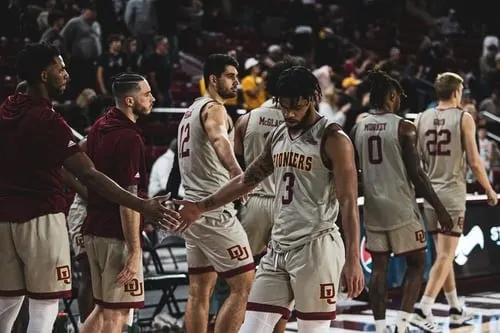One of the most difficult players to coach on a basketball team is the hothead. The unpredictability of this player’s nature and their negative attitude can result in an environment that can quickly destroy a team mentally.
No one likes to play with a player who constantly blows up during games, it isn’t any fun and can cost the team win.
While a hothead is criticizing their own coaches and teammates, you might be wasting a lot of energy and time micromanaging a hothead’s actions when you should be focusing on coaching.
So how do you deal with a hot head? On the outside, a player who is a hothead seems to be uncontrollable, that when things do not go their way it feels like the end of the world to them.
On the inside, they are passionate about the game of basketball and struggle to deal with their emotions on the court and in life.
A player-coach relationship is so important in dealing with this type of player, if both of you want to make it through the season alive.
Communicating expectations and goals are critical just to get through one game without a blow-up.
The following article is a list of tips and tricks you can use to help deal with this player type. Be warned the hot head does require a lot of energy and effort on your part as the coach.
If your a new coach and just want to win while not having to worry about such a player think again.
You may need to rethink your coaching role, as you will come across all types of players that require different strategies. The one cookie-cutter solution does not work for all players.
If you are thinking about buying a basketball jersey or shoes, check out the offers below from these retailers.
| Retailer | Promo Code | Promotion | Link to Retailer |
 | DROP | 70% OFF | Go to Fanatics |
 | PARSCR20 | 20% OFF | Go to Eastbay |
 | N/A | N/A | Go to Amazon |

Defining a Hot Head in Basketball?
This is a term used for players in sports that lose all control of their emotions during play.
It could be something big or something really small that can cause this type of player to lose their temper on the basketball court.
This player is generally always complaining about every call, always in foul trouble and likely thinks the referees are plotting against him.
If he isn’t saying anything then his demeanor is, with his face in his palms on the bench and his head down when he walks.
This may be the most toxic player on the team and you have to be careful that this player does not spread his attitude towards his teammates.
If you were on the sidelines watching the hot head play, you wouldn’t like him because of his attitude.
In fact, you might think why would a coach even bother. Usually, the hot head is a good player sometimes the best on the team.
How he views the world is much different than most people would.
As a young athlete, he has difficulty dealing with simple problematic situations that he rather blame others or he automatically feels it just his bad luck or he is being attacked.
This is a player who is hard on themselves and uses basketball to get away from life problems only to bring them on the court.
It doesn’t take much to set them off, and if only he could keep his emotions in check he could dominate the game.
Rarely does that happen as he’s not only battling basketball on the court but his emotions also.
When it comes to coaching the hothead, you feel as if you are always trying to defuse the player almost every practice and game.
This makes it difficult for any coach to focus on the team, when the majority of his time is focused on one player.
As a coach you can hear the hot head complain on the bench about playing time, your coaching, and why everyone is wrong but him.
A coach doesn’t give up on a player like this because generally off the court he is a pleasure to be around, not only is he a pleasure but he has a good relationship with the coach.
When it seems as if he is making improvements as a player and a human being it all comes crumbling down in the blink of an eye. Sound Familiar?

How to deal with the hot head as a coach?
Disciplining a hot head severly rarely works, as they can’t get their emotions in check to begin with. If it was up to them, they wish they could control themselves.
Being able to minimize this players antics and behavior is your best case. But at some point down the line, you have to deal with what’s best for the team.
If this player is disrupting the team as a whole, you might need to take drastic measures, as the last thing you want are other players quitting the team because they can’t enjoy basketball.
Here are some tips to try and minimize this player types anger.
Player-coach Relationship
A relationship as a player-coach is a must for this player to be successful on your team. Understanding the hot head will help you come up with the appropriate strategy.
What makes him tick? What’s going on in his personal life? Did they experience any traumatic events?
This is important information in order to communicate with this player effectively.
Players look at you as not only the basketball coach but a mentor. A person they can speak to about things that are going on in their life that they feel no one would understand or would care to listen to.
As a coach, it is not only your duty to teach basketball but also life lessons. With basketball, there are a lot of hardships, hard work, and minimal payoffs in the overall picture.
One team wins the conference out of 10. 9 other teams are going to be left feeling like failures, how do you as the coach turn a losing season into a winning one.
How do you apply failure to these players’ lives, so they can see there is more to life than just basketball.
I can remember detailed conversations with my high school coach years later, I will always be grateful for being able to talk to them when life sucked for the moment.
I will never forget the impact they had on my life and will always remember them for the positive change in my life.
You know you have done a good job as a coach if players come back years later to see you and catch up.
This will tell you, without them having to tell you that you made a difference in their life.
Build that relationship with every player, not just the hothead, although they may need it more than anyone else on the team.
Try not to show favor to any one player if possible.

Communication
You will find that you need to communicate your expectations to the hot head frequently, in order to prevent blow-ups.
You will even find yourself having one on one conversations constantly.
But now that you have a coaching relationship with this player, the problem can be the player taking your kindness for I can do whatever I want or feel and nothing will happen to me.
This is the time to set boundaries and expectations. One such player on my team was one of the best players I had ever coached.
The problem? He was a hot head and thought he could get away with whatever he wanted. The solution? Set boundaries and expectations.
Not only did I set those boundaries I also challenged him. The year prior he was the best player in the city and there wasn’t even a close second. But this year he definitely wasn’t.
What changed? Height. He stopped growing heading into high school while all the other players had growth spurts.
He had unbelievable skill and fundamentals but players had caught up to him in that department. He took some time away from basketball also during the summer which didn’t help him.
So, I told him like it was that he had fallen behind and he’s not that player anymore. Well, it lit a fire under his ass.
He started working his ass off in practice and had no time to complain. While it didn’t solve his issues with his temper entirely.
It definitely distracted him from it. I would speak with him before the game during the game and at halftime about his emotions.
If he was doing well, I would let him know. If he was losing it, I would try to defuse the situation. But the point was to intercept the hot head’s emotions before it was too late.
This is what I would do often. If I was pulling him out of the game, I would let him know he was coming in soon.
The reality is there may not be a thing you do or say that makes this player change.
This is who they are right now, I say right now because you hope somewhere down the line they can change their view of themselves and the world while having a better understanding of why things happen the way they do.
So much pressure is put on this player by himself to perform that it is inevitable that they may never be able to live up to their own expectations.
You as the coach just hope that someday down the line in their path of life they remember the very things you instilled during your coaching. It hopefully clicks and triggers within themselves change.
But if that doesn’t happen at least he can’t say that you gave up on him.

Helpful tips for the Hothead Player
Visualization
Visualization is a powerful concept that can be used in basketball to help prepare you for a game.
Studies show the value in visualization and affirmations. The saying goes you are what you think you are, I think that’s a saying?
Regardless, I have used visualization to help me with my basketball game. Simply find a quiet place and play out the game that you are about to play in your mind with your eyes close.
See yourself playing on the court making the right plays and dominating the game, play out the whole game in your head.
This can also use with the player to visualize himself keeping calm and reacting appropriately when there is a bad call.
He will see himself making the correct decision when something trigger’s him.
Breathing
Breathing exercises can sound stupid to some people until they try it and find they are able to calm themselves much quicker.
Breathing serves two purposes, one distracting the player from the issue that is causing them to rage by focusing on their breathing and slowing down the heart rate.
The hardest part is to remember to breathe when in fact the player is in that state. Communicating with the player and ask them what works for them when they are in an angry state is an even better option.
Space
When the player does have a blow-up and it looks like there is no point of return, allow the player space.
Do not get in their face, this is the last thing you want to do. Understand he is past the point of communication and what you say or do may not matter.
Guide him to the bench or dressing room to allow him to blow up, you don’t want them doing something regretful or embarrassing so try to get him to an area where he can vent.
It may take what feels like hours before they calm down, and you could easily be down a player when they are in a state of anger while the clock reads second quarter with 8 minutes left in the game.
At halftime go over the expectations and see if they are willing to communicate. Try and redirect them to what matters, such as telling the player we have a whole half left in the game and we need you back to help us win, etc.